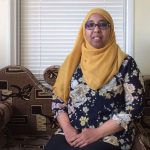Inspirational Women – Nusrat Zamir, Volunteer at Sharan Project
How did you get to where you are today?
For me, it has been a very difficult journey as my family and community did not approve of girls having an education. Therefore, getting my GCSE’s and further education was a real uphill struggle.
I have had to work so much harder than most people to get to where I am today. I was withdrawn from school aged fourteen and sent abroad for six months. Upon my return I was kept at home and away from education for a further four months. Education was not my right. It was a privilege only the boys were able to enjoy.
I originally enrolled at university whilst married to my ex-husband but he too did not approve and made life very difficult. Studying was something that was done late at night whilst he slept as I was not permitted to open my books whilst he was around. He was a violent and abusive man and after two years I withdrew from university in order to sort out my life. By this time, I had suffered a miscarriage and also given birth to a baby girl. The abuse was a daily occurrence, and I could not continue in this way. Especially as I was a mother to a little girl who could herself be in this situation one day.
Almost five years into such a marriage, I found the courage to get Police intervention and file for a divorce. I decided that I would live my life on my terms, despite what anyone else thought. Wanting to be the best role model possible to my young daughter, I went back to university and graduated with a BA (Hons) in English Literature. I then won a scholarship to study postgraduate law and the legal practice course to qualify as a solicitor.
In 2014 after having my youngest daughter I decided that I needed to do something for my area and my community. I could not afford childcare so could not go into employment and instead decided to realise my vision of setting up a community group for local Asian women. It was called Chadwell Heath Asian Women’s Network. The late chairwoman of Chadwell Heath Community Centre, Anne Estlea, after hearing about my desire to do something to support and empower Asian women looked me in the eye and said ‘Hold onto your dreams girly! Don’t ever let them go!’
This was the first time in my 35 year life someone had validated my vision and given me the go ahead (and with that came confidence and strength) to do what I believed in and felt so passionately about.
This community group provided a safe space for local Asian women to meet and discuss issues. We had informal discussions on many topics including forced marriages and domestic violence. I spoke from my experiences and gave women the confidence to seek help.
What barriers do women face in particular along the career path you’ve chosen?
I am currently planning on studying for a PhD and retraining as a barrister specialising in Human Rights. Law has always been a predominantly male dominated profession, particularly in the higher ranks. For me the particular barrier would be the work-life balance. This may be the reason why the top of the profession is dominated by men.
Being a mother, it is important for me to have quality time with my children but equally important for them to see that I do something that I am passionate about. This is the constant dilemma I find myself in. With childcare being so expensive in the capital and having no family to help out, what I do with my career hugely depends on what kind of support is available to me.
I am currently doing public speaking about my experiences, making professionals aware of the harmful practices inflicted on some Asian women and giving a ‘survivor perspective’. This works for me as the hours are flexible but unfortunately it is all unpaid voluntary work. Again disadvantaging us women. Currently, my desire to make a difference is outweighing the desire to make money and I hope that as time goes on and I qualify as a barrister I will have the experience and skills to make a niche for myself in the legal word.
How/have you been able to challenge these barriers?
Challenging barriers has become second nature to me after my previous experiences and currently I am breaking barriers and thrashing stereotypes through my speaking engagements. By lifting the silence on honour based abuse and forced marriage and speaking about what happened to me, I am inspiring women to speak up against abuse and harmful practices. I am also giving insights to professionals and service providers regarding this practice which has been largely secretive. We see many statistics but they are not accurate, there are many women and girls suffering the way I did, but who do not have the courage or safe space and support to speak out.
What does Women’s Day mean to you and why is it important?
Women’s Day to me is a celebration of the many things that women do but are never acknowledged for. As mothers we sacrifice our potential careers to have and bring up our children. We resign ourselves to a sometimes monotonous existence, often wondering if this is all there is to life.
Coming from the community that I have, women were and, in some cases, still are almost non-existent entities. This lack of validation causes huge conflict within us. On the one hand, we know we exist and have thoughts and feelings, ambitions and desires. Yet we are never part of the fabric of our society. Existing on the periphery is never a good thing.
Having a day dedicated to women is the very least that can be done. I for one ensure that my daughters learn about the struggles of women and engage in the debate from early on. It is important that women and their plight as well as their achievements are celebrated. Being born a woman need not be something to be ashamed of nor should it be a licence for lifelong condemnation by men.



